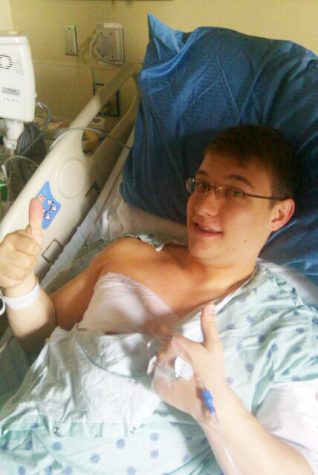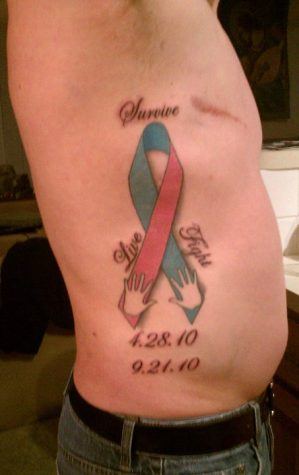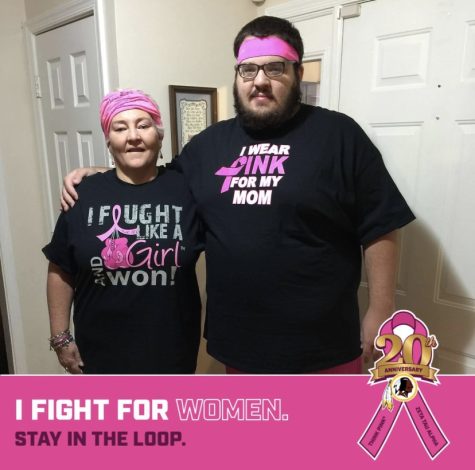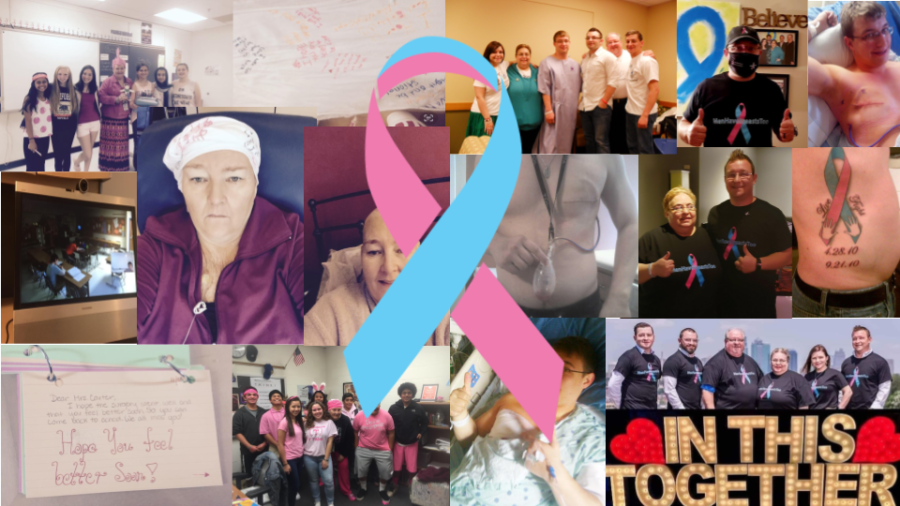Fighting the same fight: Carter and Miller share stories of survival and inspiration
graphic by Madeline Hull
Brett Miller and Elizabeth (Beth) Carter have never met, but they both survived the same cancer. What are their shared experiences?
October 29, 2021
The month of October includes a flurry of pink events to honor Breast Cancer Awareness Month.
Two years ago in October 2019, Varsity and JV girls field hockey packed their jerseys away and wore hand-made black t-shirts with cancer ribbons down the front. During halftime of the varsity field hockey game, a teary-eyed crowd looked on as two survivors and the family of a past cancer fighter attended were honored as part of October Breast Cancer Awareness Month.
Every fall, at Back to School night, the SGA Breast Cancer Awareness shirt table stands out, an island of neon pink. The SGA sells neon pink shirts to raise money for the American Cancer Society. By selling pink-out shirts, they hope to increase fundraising and participation in the first service project of the year. T-shirts can also be bought during football home games throughout the season.
More recently, on October 17, teams of students and staff participated in the annual Breast Cancer Awareness walk in Mount Airy. Survivors, fighters, and supporters from all over the county showed up to bring awareness to the disease and raise money for local cancer research. The Linganore team of walkers raised over $1000.
Throughout Breast Cancer Awareness month, in support, many of the athletic teams host “pink-out” games where spectators and athletes all dress in pink.
Although rare, men can also get breast cancer. Going against stereotypes is hard enough, let alone being a man with a women disease.
Breast cancer is the most common type of cancer in women, an estimated 281,550 new cases are expected to be diagnosed in women during 2021. About 2,650 cases of invasive breast cancer are expected to be diagnosed within men during 2021. A man’s lifetime risk of breast cancer is about 1 in 833 men.
Brett Miller and Elizabeth (Beth) Carter have never met, but they both survived the same cancer. What are their shared experiences?
Stop discriminating, men get breast cancer, too: Brett Miller
A typical 17-year- old guy, high school senior, on the football and wrestling team, was getting ready to start his life. Flash forward eighteen years, Brett Miller celebrates his eleventh year of being a Breast Cancer Survivor.
In April 2003, one day he scratched his chest and felt a lump behind his right nipple. With no medical insurance at the time, the closest thing to a physician was the school doctor. The doctor wasn’t concerned. They said it would go away.
Seven years later, after graduating from college, receiving his first job that qualified for health insurance, a routine check up appointment was made. During the exam, after asking, the doctor looked at the lump. He suggested a sonogram, but again, the doctor didn’t think there was anything to be concerned about.
The next day, the phone rang: Miller had breast cancer.

On May 18 in 2010, after a quick and successful surgery, all the cancer was gone. The cancer was caught very early and was classified as Stage 1. Following the mastectomy, Miller went through four rounds of chemotherapy as a precaution due to his family’s history with breast cancer.
His mission now is to spread the word to men and women, young and old, that breast cancer does not discriminate. It can happen to anyone. In May 2010, he started The Bret Miller 1T Foundation with the aim of raising awareness in colleges and high schools, by telling youth that breast cancer can happen to anyone.
In 2014, Miller co-founded the Male Breast Cancer Coalition.
“Since my diagnosis, I have always been open to talking about my breast cancer. This is something I think was meant to happen to me, so that I could help others,” said Miller.
Miller is currently working on a documentary about male breast cancer, “Men Have Breasts, Too” will share stories from men who are members of what is usually a women’s only club, hear from family members impacted by male breast cancer, understand more about the disease from doctors and help spread awareness that men can indeed get breast cancer too. He hopes the documentary will ignite a serious discussion about detection and education for men with breast cancer.
What were some of your first thoughts when you heard your diagnosis?
When I first got the call I was sitting in my car, leaving one job to go to my second job. The doctor didn’t ask if I was sitting down, should come in to discuss, or not driving. He just straight up told me that the preliminary pathology reports are saying it’s breast cancer but he hasn’t fully read the report. He would do so and get back to me in 3-5 days. I thought it was a joke, I didn’t really think that it could happen to me.

Were there any programs or services offered to you that would help with the treatment process?
I met with another surgeon for a second opinion. In my appointment with him, he stated that most men don’t talk about breast cancer, they are too embarrassed to say “breast.” He told me that if I was willing to share my story, he could see me as a face of male breast cancer. That I could have a huge impact on men as I was so young. I had a great support system of doctors, nurses, family and friends. They are truly all you need when diagnosed with cancer.
Tell me about your support system.
My family and friends were with me 100%. Always willing to help with whatever I needed. At times it was tough for us all but that’s when I would crack a joke. I found that humor was what made it easier for all to get through cancer. As for now, our mission is as strong as ever and my biggest supporters are my wife Tasha, daughter Riley, and my cancer buddy dog, Salvy.
What message would you provide men and women, who are battling Breast Cancer?
That you do need a support system. You have to have someone that is there for you, a caregiver, significant other, friend or family member. There is so much information that comes your way at initial diagnosis that you can’t take it all in yourself. You need someone else that can take notes and help ask the right questions. But if you can be your own best advocate, know your body, do your monthly breast self exams and if you find a lump get to a doctor. You can find more information on our website www.malebreastcancercoalition.
Beth Carter put on her “boxing gloves” and won the fight against cancer
Diagnosed with breast cancer on September 30, 2014, teacher, mother and wife Beth Carter prepared to fight.
Her breast cancer was originally diagnosed at stage 1, but after surgery, her doctors discovered it was stage 2 because it had spread to her lymph nodes.
Carter is a seventh grade math teacher in Loudon, Virginia. Starting her day same as always with nothing out of normal when she got a phone call.
“I remember exactly where I was when I got the call from my doctor. I was at school in a resource (study hall) class. I took the call in our counselor’s office. Even though the doctor had prepared me, when she said that she was 99.9% sure it was cancer, it felt like I was punched in the stomach,” said Carter.
She was able to make one phone call before heading back to class.

“I asked Gregg [her husband] to call our kids. It took me several minutes to regain my composure to return to class and continue teaching that day. The rest of the day was full of lots of tears and fear of what was to come,” said Carter.
There is no history of breast cancer in her family. The doctor said it was just “bad luck.”
Doctors said trying to stay in class could open the door to infections, so during chemotherapy, Carter had to stay home. Yet, Carter’s determination to fight kicked in.
Her husband Gregg is a system engineer for a technology company called Cisco. He reached out to his co-workers to find a way to reunite Carter with her students virtually. This was six years before the coronavirus forced schools to figure out online instruction.
Cisco gladly provided a TelePresence™ EX90 system for use in her house, and a TelePresence SX20 Quick Set (which was hooked up to her classroom Promethean Board). The system streamlines her desktop at home so she can move fluidly from individual work, to video calls, to problem solving over shared documents. This let Beth talk to her students face-to-face in real-time to solve math problems.
“It enabled me to really feel like I’m still in the classroom, ‘cause I could still interact with the kids. They could talk to me. I could talk to them. I could see what they’re doing, and they could ask me questions,” Carter said.
A substitute teacher watches over the class while Carter leads instruction from her basement. Loudoun County Public Schools officials said they fully support it.
“When she said she wanted to continue and had a means to do that, I was excited. I said, ‘Great, let’s do it,” said Principal Mark McDermott.
Carter has officially been cancer free for the last five years.
Co-editor-in-Chief Madeline Hull interviewed Beth Carter.
What were some of your first thoughts when you heard your diagnosis?
It took me a long time to wrap my head around my diagnoses. My first thought was fear of the unknown. What if my treatment didn’t work and I died? Why me? And how would I be able to keep teaching my kids? After I received my “cancer phone call” I needed to have several more tests and doctors appointments to develop a treatment plan. Once I had a plan I put on my ‘boxing gloves’ and got ready to fight.
Tell me about your support system.
My support system was and is amazing. I had me family both my immediate family and extended, friends, and my entire school- staff, students and parents of my students. On the day of my first surgery my school did a pink out and took pictures and created a photo album for me. My fellow teachers had my students write me notes and the created a gift basket. Students and staff would check on me daily, teachers made meals for my family for months. I had fellow teachers who had been diagnosed and treated before me who offered advice and support as well.
What message would you provide men and women, who are battling Breast Cancer?
Attitude is half the battle once you get over you own pity party you need to put on you boxing gloves and fight. If you believe you will win the battle you will. Ask for help if you need it, everyone reacts to treatment differently so if you need help with meals ask, help with your kids ask, help with household choirs ask. Remember you are not alone in this battle and the survival rate is getting better and better each day. Also do everything your doctor recommends and always always get your mammograms as recommended by your doctors.
This story was originally published on The Lance on October 28, 2021.




































